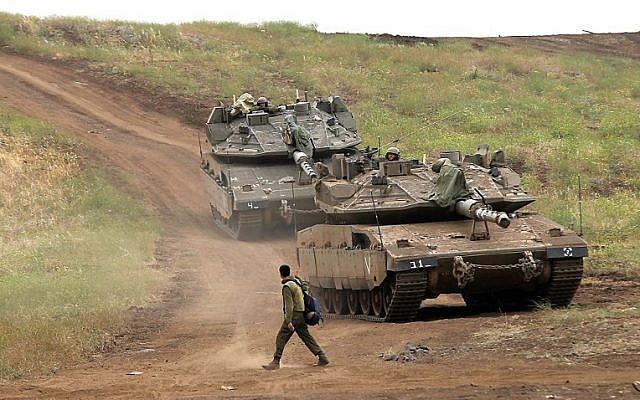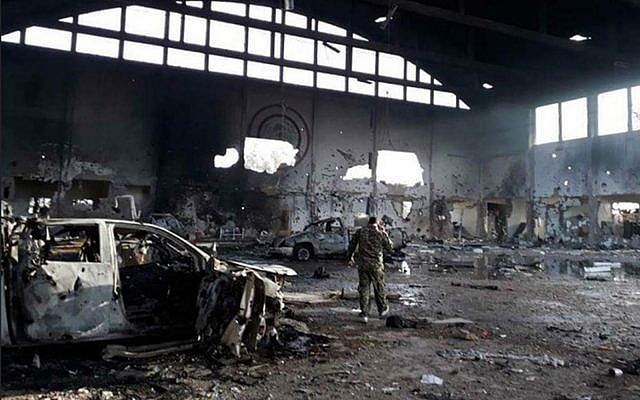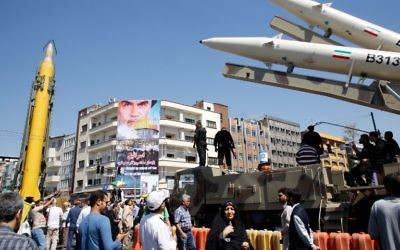Security officials preparing for missiles strikes by Tehran’s proxies, but also for possible attempts to breach army bases, communities

The Israeli military was in a state of high alert in the country’s north Monday, in readiness for possible retaliation by Iran over alleged Israeli strikes on its sites in Syria. Security forces are preparing for the possibility of attempted infiltrations of military bases and communities in the north, Hadashot TV news reported.
According to the report, security forces are taking steps to mitigate the damage from any such potential attack, fearing that a harsh Iranian strike could force Israel’s hand and lead to an unwanted escalation with Tehran.
Israeli officials believe Iran’s Revolutionary Guards are leading efforts to retaliate against Israel, using its proxies in Syria — Hezbollah forces and Shiite militias — to attack the Jewish state, Hadashot reported.
Local authorities in the north of Israel sought to calm residents Monday after defense officials warned of the looming possibility of attack, including missile strikes on military targets.
Tehran vowed revenge after the T-4 army base in Syria was struck in an air raid on April 9, killing at least seven members of the Iranian Revolutionary Guard Corps. The strike was widely attributed to Israel, though Jerusalem refused to comment on it. T-4 was the base from which Israel said Iran launched an attack drone into Israel in February. Late last month, a second strike, allegedly conducted by Israel, against an Iranian-controlled base in northern Syria was said to have killed more than two dozen Iranian soldiers.

Iran’s army chief of staff warned Monday that the regime would respond to any Israeli aggression “at an appropriate time,” as the countries continued to trade threats amid spiraling tensions.

“If the enemy casts a covetous eye on our interests or conducts [even] a slight act of aggression, the Islamic Republic will give an appropriate response at an appropriate time,” Maj. Gen. Mohammad Bagheri said according to regime-affiliated Press TV.
Iran has access to a variety of surface-to-surface missiles, from short-range Fajr-5 rockets to medium-range Fateh 110 missiles, which have a range of approximately 300 kilometers (190 miles), to long-range Shahab ballistic missiles capable of hitting targets over 1,300 kilometers (800 miles) away.
“We have very advanced anti-missile systems: Iron Dome, David’s Sling, the Arrow,” Maj. Gen. (res.) Yaakov Amidror, a former head of Military Intelligence and one-time national security adviser to Prime Minister Benjamin Netanyahu, told reporters, referring to Israel’s air defense batteries, which are designed to shoot down short-, medium- and long-range missiles, respectively.
“I hope that most of the missiles would be intercepted by our defense systems, and military targets are supposed to absorb such attacks from time to time,” he said.
If these active air defense batteries fail, however, there are concerns that Israel’s passive protection against missiles — bomb shelters — will not provide an adequate solution.
“The working assumption is that they are planning to strike military targets, but it can escalate at any moment, and we will find ourselves in an entirely different kind of situation,” Kiryat Bialik Mayor Eli Dukorsky told Walla news. “This requires Israel to urgently fill in gaps in defense, but also requires each of us to understand that preparation should be on a personal level, as well as on a community level.”
No special safety instructions were given to residents of northern Israel, despite the threat, but the heads of local governments said they were always ready for any eventuality.
Kiryat Shmona Municipal CEO Eshkol Shukrun urged residents to remain calm, Channel 10 reported.
“The army has asked us to send a message of calm,” he said, saying that any steps they took would be closely coordinated with the army.
“Our residents are curious, and they listen to media reports, and some of them also call and ask why we have not opened the bomb shelters or made plans to evacuate them,” he added. “We give responsible answers, mainly to calm them down. We tell them that municipal officials are in direct contact with the army.”
Defense Minister Avigdor Liberman said there was no need for panic.
“There are challenges and many threats, but we know how to deal with all the threats and to cope with all the challenges,” he said from the Knesset on Monday. “There is no room for euphoria or pride, but we are ready for any scenario.”

He also stressed that Israel is not interested in escalating the situation.
On Monday, Rambam Medical Center in Haifa inaugurated a reinforced command center to serve the hospital management in the event of a missile attack on the city. They were also prepared to transfer patients to a 2,000-bed fortified underground emergency hospital if necessary.
Haifa mayor Yona Yahav said the northern coastal city was preparing for a wartime scenario.
“We are prepared 365 days a year for a crazy person to do something irresponsible like launch missiles at Haifa,” said Haifa Mayor Yona Yahav, according to the Walla news site.
He urged city residents to carry on with their normal routines, offering assurances that city officials were monitoring the situation and all municipal bomb shelters were well maintained.
As reported by The Times of Israel
